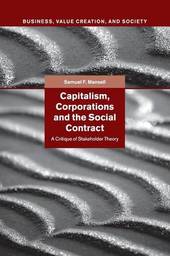
|
Capitalism, Corporations and the Social Contract: A Critique of Stakeholder Theory
Paperback / softback
Main Details
| Title |
Capitalism, Corporations and the Social Contract: A Critique of Stakeholder Theory
|
| Authors and Contributors |
By (author) Samuel F. Mansell
|
| Series | Business, Value Creation, and Society |
|---|
| Physical Properties |
| Format:Paperback / softback | | Pages:198 | | Dimensions(mm): Height 229,Width 152 |
|
| Category/Genre | Business strategy
Business ethics |
|---|
| ISBN/Barcode |
9781107529946
|
| Classifications | Dewey:174.4 |
|---|
| Audience | | Professional & Vocational | |
|---|
|
Publishing Details |
| Publisher |
Cambridge University Press
|
| Imprint |
Cambridge University Press
|
| Publication Date |
21 May 2015 |
| Publication Country |
United Kingdom
|
Description
In whose interests should a corporation be run? Over the last thirty years the field of 'stakeholder theory' has proposed a distinctive answer: a corporation should be run in the interests of all its primary stakeholders - including employees, customers, suppliers and financiers - without contradicting the ethical principles on which capitalism stands. This book offers a critique of this central claim. It argues that by applying the political concept of a 'social contract' to the corporation, stakeholder theory in fact undermines the principles on which a market economy is based. The argument builds upon an extensive review of the stakeholder literature and an analysis of its philosophical foundations, particularly concerning the social contract tradition of John Rawls and his predecessors. The book concludes by offering a qualified version of Milton Friedman's shareholder theory as a more justifiable account of the purpose of a corporation.
Author Biography
Samuel F. Mansell is a Lecturer in Management at the University of St Andrews. Samuel's research interests continue to lie in the application of political and moral philosophy to the field of business ethics, with particular reference to the work of Aristotle, Aquinas, Hobbes and Kant. He is currently researching the roles of distributive justice and charity in the modern corporation.
Reviews'Sam Mansell has produced a fine critical analysis of stakeholder theory. He is both a skeptical and a sympathetic critic, a difficult road to follow, yet the results are a fine example of how to give the best possible interpretation of a position, before one begins to criticize it ... Mansell's critique has the potential to make stakeholder theory better and stronger.' R. Edward Freeman, University of Virginia, from the Foreword 'Mansell offers a thorough but highly readable, a close but wide ranging, and a sympathetic but ultimately critical account of stakeholder theory which renews key debates about the corporation and its objectives.' Jeremy Moon, International Centre for Corporate Social Responsibility, Nottingham University Business School 'Samuel Mansell tackles a central aspect of the currently fashionable discourse of social responsibility in relation to theories of social contract and justice by interrogating the principles of social justice and fairness that lie underneath the rhetoric of free markets. His careful analysis is required reading for those who want to go beyond the PR sloganizing and tick-box compliance into a re-evaluation of market principles in the democratic society.' David Weir, Head, School of Business, Leadership and Enterprise, University Campus Suffolk 'Samuel Mansell develops a sustained critique of stakeholder conceptions of the corporation, demonstrating their fundamental incoherence. What makes this book stand out, apart from its rigour and its dispassionate fairness, is its author's notable philosophical sophistication and, what is even rarer, his historical literacy. These between them allow him (in particular) to subvert the 'social contract' fictions on which CSR and stakeholder doctrines rely, without however suggesting that shareholder conceptions are unproblematic, or that there are plausible 'critical' alternatives.' Harro Hopfl, Essex Business School 'The book should be essential reading not only for those interested in the theory and practice of business administration, but also for political philosophers at large.' Agustin Jose Menendez, Political Studies Review 'A necessary read for scholars interested in the corporate purpose debate ... It builds on a wide range of philosophical sources that underpin stakeholder theory or capitalist thinking ... takes this debate forward in a significant manner.' Sebastien Mena, Organization Studies
|